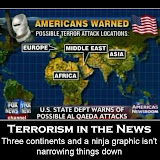Spencer Ackerman has a piece in the Washington Independent about how Sadr is an effective counterinsurgent because he was able to reach out to disenfranchised Shi'ites and implement some form of political stability in the early days of OIF. I'm no Iraqi, so I'm reluctant in speaking for Sadr's popularity, but recent events have shown how the Sadr and his Mahdi Army followers are more engaged in Tony Soprano tactics than Robin Hood-style benevolence. The racketeering of basic services, which the Mahdi Army employs to control the population of the Sadr City district in Baghdad, is exemplified in this Time article:
Sheikhly said government aid delivery has been directly targeted by armed fighters. "The food rations and convoys are being targeted with IEDs," the government spokesman said. "The ambulances are being targeted with IEDs, and the vehicles which try to replace generators in some of the sectors are also being targeted by some of those terrorists."
More blame will be placed on the Iraqi government and US forces for not being able to provide food/services, because of these tactics which only harm the residents. By intentionally exacerbating the humanitarian crisis in Sadr City, the militia can gain more power and psychological control of the district's impoverished residents, as they convince the people that their government has abandoned them.
The recent Iraqi delegation to Iran should be taken with a grain of salt, but it appears that Iran publicly supports the recent crackdown on Shi'ite militias. The exportation of lethal weaponry (EFPs, 240mm rockets, anti-aircraft missiles, etc.) and training of special groups has compounded the problem of Shi'ite militias in Iraq, as Iran has played a dangerous game of destabilizing Iraq to make their old rival, the US, look bad. This recent delegation has the potential to stop at least some of the malign activity, and the special groups (using the Mahdi Army as religious cover) may see funds and weapons drying up in the near future.
So that would just leave the Sadrists (without Iranian backing), who supposedly are getting less popular in the rest of Baghdad (see recent article from Bill Ardolino). General Petraeus still hasn't burned the bridge for political reconciliation with the Sadrists, as he publicly stated "I think it's very important to recognise that the Sadr trend, as a political movement, has every reason to be engaged in the political spectrum, in the political arena, in Iraq." So Sadr and his spokesman can either recognize that the only organized armed groups should be the Iraqi Security Forces, or this violence can go on and on until October provincial elections while the citizens of Baghdad suffer.










 See what the others have said:
See what the others have said:
4 comments:
I think a better caption for your slide would be, "My peepee is this big."
Olgreydog7,
hehe. I wonder if this post has anything to do with the upsurge in "activity" this weekend. And who says Sadr's people are illiterate, haha.
Lt.,
I couldn't comment on the Ackerman piece because Wordpress hates me, so here goes.
I agree more with your analysis regarding Sadr's tactics. Counterinsurgency is about using the least amount of force possible. Sadr still has great use for violence, as you mentioned WRT to rackeetering and the control of service delivery. I see his tactics as being more of the old-style of insurgency practiced by Mao, which also seeks to coopt the population but at the same time delegitimize the government. The Sadrists have also embraced more novel forms of population-centric warfare, like population displacement and ethnic cleansing. From what I've read, the Sadrists were clearing out Sunnis from Baghdad in 2006, although in Moqtada's defense, these might the rogue elements of his movement that he can't control.
That being said, Ackerman is right in emphasizing that the Sadrists cannot be defeated militarily and have to be coopted. Sadr represents the mass of the Shiite poor which has not accepted the legitimacy of the Shiite exiles like SCIRI-Dawa. Until this segment of the Iraqi population is represented in the government, they will always see it as legitimate. It might be easier to simply coopt Sadr and his ability to do service delivery instead of competing with him in this respect on the ground in Sadr City.
Mr. Pampinella,
Thank for the sharp insight. In 2006, I think there were other Shi'ite groups involved in ethnic cleansing, but the Sadrists seemed to have played the biggest role. Co-opting Sadr has prvoen difficult, as much of his rhetoric is based on despising the Maliki-led government and kicking out us "occupier" types. It's a big ole mess, but we just try to do our best.
Post a Comment